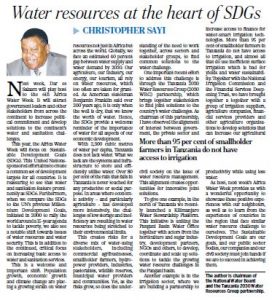The Citizen: Water resources at the heart of SDGs
News Source: The Citizen, newspaper Tanzania

Op-ed by Engineer Sayi, Saturday, July 16th, 2016. The author is chairman of the National Water Board and the Tanzania 2030 Water Resources Group partnership.
Dar es Salaam will host to the 6th Africa Water Week from July 18 to 22. It will attract government leaders and other stakeholders from across the continent to increase political commitment and develop solutions to the continent’s water and sanitation challenges.
This year, the Africa Water Week will focus on Sustainable Development Goals (SDGs). This United Nations sponsored effort aims to create a common set of development targets for all countries. It is reassuring to see that water and sanitation feature prominently as SDG6. Furthermore, when we compare the SDGs to the UN’s previous Millennium Development Goals, initiated in 2000 to rally the world around a 15-year agenda to tackle poverty, we also see a notable shift towards issues of water resources and water security. This is in addition to the continued, critical focus on increasing basic access to water and sanitation services.
This is a welcome and important shift. Population growth, economic growth and climate change are placing a growing strain on water resources not just in Africa but across the world. Globally, we face an estimated 40 percent gap between water supply and water demand by 2030. Our agriculture, our industry, our energy, our tourism, all rely on water resources, which too often are taken for granted. As American statesman Benjamin Franklin said over 200 years ago, it is only when the well is dry, that we know the worth of water. Hence, the SDGs provide a welcome reminder of the importance of water for all aspects of our economic development.
With 2,300 cubic metres of water per capita, Tanzania does not lack water. What we lack are the systems and infrastructure to store and efficiently utilize water. Over 80 per cent of the rain that falls in Tanzania is never touched for any productive or social purpose. In areas where economic activity – and particularly agriculture – has developed more intensively, the challenges of low storage and inefficiency are resulting in water resources being stretched to their environmental limits.
This creates risks for a diverse mix of water-using stakeholders, including commercial agribusinesses, smallholder farmers, hydropower providers, industries, pastoralists, wildlife reserves, municipal water providers and communities. Yet, as the risks grow, so does the understanding of the need to work together, across sectors and stakeholder groups, to find common solutions to the water challenge.
One important recent effort to address this challenge is through the Tanzania 2030 Water Resources Group (2030 WRG) partnership, which brings together stakeholders to find joint solutions to the country’s water challenges. As chairman of this partnership, I have observed the alignment of interest between government, the private sector and civil society on the issue of water resource management.
This alignment creates opportunities for innovative joint solutions. To give one example, in the north of Tanzania we recently launched a Kilimanjaro Water Stewardship Platform. This initiative is uniting the Pangani Basin Water Office together with actors from the horticulture and sugar industry, development partners, NGOs and others, to develop, coordinate and scale up solutions to tackle the growing water resource challenges in the Pangani basin.
Another example is in the irrigation sector, where we are building a partnership to increase access to finance for water-smart irrigation technologies. More than 95 per cent of smallholder farmers in Tanzania do not have access to irrigation, and almost all that do use inefficient surface irrigation which is bad for yields and water sustainability. Together with the National Irrigation Commission and the Financial Services Deepening Trust, we have brought together a together with a group of irrigation suppliers, agriculture companies, financial services providers and other agriculture organizations to develop solutions that can increase our agricultural productivity while using less water.
As host, Africa Water Week provides us with a wonderful opportunity to showcase these positive experiences with our neighbors, as well as to learn from the experiences of countries in the region that face similar water resource challenge to ourselves. The Sustainable Development Goals are our goals, and our public sector bodies, our companies and our civil society must join hands if we are to succeed in achieving them.
